全新版大学英语综合教程第一册教案
- 格式:doc
- 大小:355.50 KB
- 文档页数:61
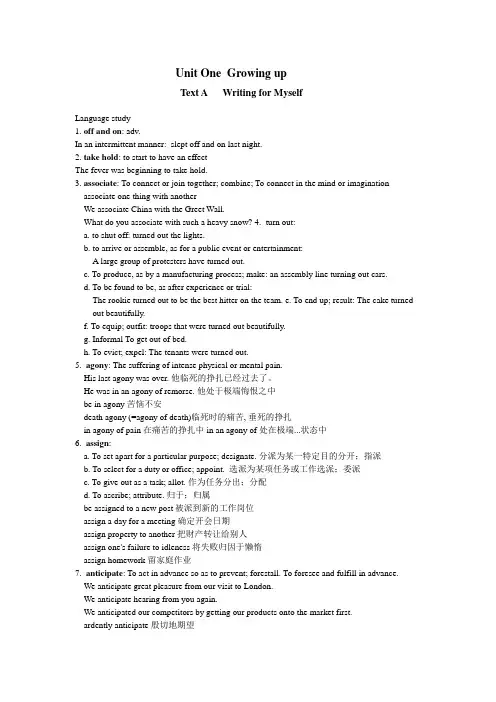
Unit One Growing upText A Writing for MyselfLanguage study1. off and on: adv.In an intermittent manner: slept off and on last night.2. take hold: to start to have an effectThe fever was beginning to take hold.3. associate: To connect or join together; combine; To connect in the mind or imagination associate one thing with anotherWe associate China with the Greet Wall.What do you associate with such a heavy snow? 4. turn out:a. to shut off: turned out the lights.b. to arrive or assemble, as for a public event or entertainment:A large group of protesters have turned out.c. To produce, as by a manufacturing process; make: an assembly line turning out cars.d. To be found to be, as after experience or trial:The rookie turned out to be the best hitter on the team. e. To end up; result: The cake turned out beautifully.f. To equip; outfit: troops that were turned out beautifully.g. Informal To get out of bed.h. To evict; expel: The tenants were turned out.5. agony: The suffering of intense physical or mental pain.His last agony was over. 他临死的挣扎已经过去了。
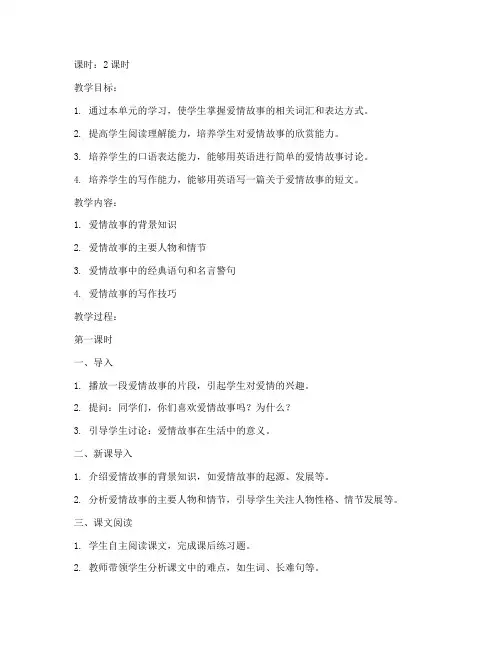
课时:2课时教学目标:1. 通过本单元的学习,使学生掌握爱情故事的相关词汇和表达方式。
2. 提高学生阅读理解能力,培养学生对爱情故事的欣赏能力。
3. 培养学生的口语表达能力,能够用英语进行简单的爱情故事讨论。
4. 培养学生的写作能力,能够用英语写一篇关于爱情故事的短文。
教学内容:1. 爱情故事的背景知识2. 爱情故事的主要人物和情节3. 爱情故事中的经典语句和名言警句4. 爱情故事的写作技巧教学过程:第一课时一、导入1. 播放一段爱情故事的片段,引起学生对爱情的兴趣。
2. 提问:同学们,你们喜欢爱情故事吗?为什么?3. 引导学生讨论:爱情故事在生活中的意义。
二、新课导入1. 介绍爱情故事的背景知识,如爱情故事的起源、发展等。
2. 分析爱情故事的主要人物和情节,引导学生关注人物性格、情节发展等。
三、课文阅读1. 学生自主阅读课文,完成课后练习题。
2. 教师带领学生分析课文中的难点,如生词、长难句等。
3. 学生分组讨论课文内容,分享自己的理解。
四、课堂活动1. 学生分组进行角色扮演,模拟爱情故事中的对话。
2. 教师点评学生的表演,指出优点和不足。
第二课时一、复习导入1. 复习上一节课的内容,检查学生对爱情故事的了解程度。
2. 引导学生总结爱情故事中的经典语句和名言警句。
二、课文阅读1. 学生自主阅读课文,完成课后练习题。
2. 教师带领学生分析课文中的难点,如生词、长难句等。
3. 学生分组讨论课文内容,分享自己的理解。
三、写作训练1. 教师讲解爱情故事的写作技巧,如人物塑造、情节安排等。
2. 学生根据所学内容,用英语写一篇关于爱情故事的短文。
3. 学生互评作文,教师点评学生的写作水平。
四、总结与拓展1. 总结本单元的学习内容,强调爱情故事在大学英语学习中的重要性。
2. 拓展:推荐一些优秀的爱情故事书籍和电影,供学生课后阅读和观看。
教学评价:1. 学生在课堂活动中的参与度,如角色扮演、讨论等。
2. 学生对爱情故事的阅读理解能力,如课后练习题的完成情况。
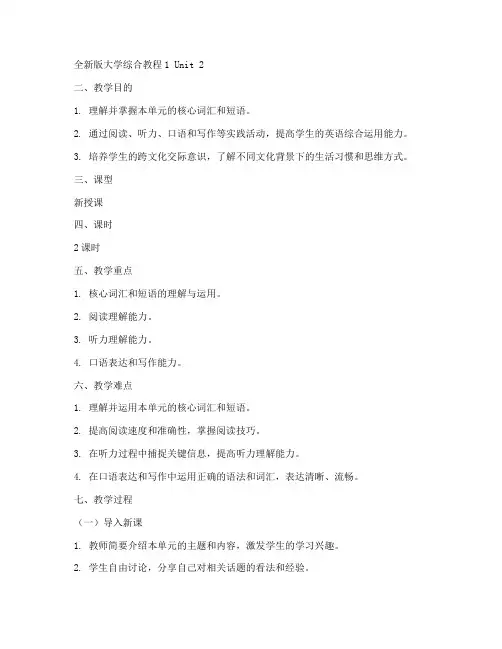
全新版大学综合教程1 Unit 2二、教学目的1. 理解并掌握本单元的核心词汇和短语。
2. 通过阅读、听力、口语和写作等实践活动,提高学生的英语综合运用能力。
3. 培养学生的跨文化交际意识,了解不同文化背景下的生活习惯和思维方式。
三、课型新授课四、课时2课时五、教学重点1. 核心词汇和短语的理解与运用。
2. 阅读理解能力。
3. 听力理解能力。
4. 口语表达和写作能力。
六、教学难点1. 理解并运用本单元的核心词汇和短语。
2. 提高阅读速度和准确性,掌握阅读技巧。
3. 在听力过程中捕捉关键信息,提高听力理解能力。
4. 在口语表达和写作中运用正确的语法和词汇,表达清晰、流畅。
七、教学过程(一)导入新课1. 教师简要介绍本单元的主题和内容,激发学生的学习兴趣。
2. 学生自由讨论,分享自己对相关话题的看法和经验。
(二)讲授新课1. 阅读理解(1)教师引导学生快速浏览文章,了解文章大意。
(2)学生分组讨论,分析文章结构、段落大意和关键信息。
(3)教师总结,讲解文章中的难句和重点词汇。
2. 听力理解(1)教师播放听力材料,学生听后回答问题。
(2)教师讲解听力技巧,指导学生如何捕捉关键信息。
(3)学生分组讨论,分享听力感受和收获。
3. 口语表达(1)教师引导学生围绕本单元主题进行口语练习。
(2)学生分组进行角色扮演,模拟真实场景。
(3)教师点评,指导学生如何提高口语表达能力。
4. 写作(1)教师讲解写作技巧,指导学生如何组织文章结构。
(2)学生根据教师提供的写作框架,完成写作任务。
(3)教师点评,指导学生如何提高写作能力。
(三)巩固练习1. 学生完成课后练习,巩固所学知识。
2. 教师选取部分练习进行讲解,帮助学生解决疑难问题。
(四)归纳小结1. 教师总结本单元所学内容,强调重点和难点。
2. 学生回顾所学知识,分享学习心得。
(五)作业布置1. 学生预习下一单元内容,为下一节课做好准备。
2. 完成课后练习,巩固所学知识。
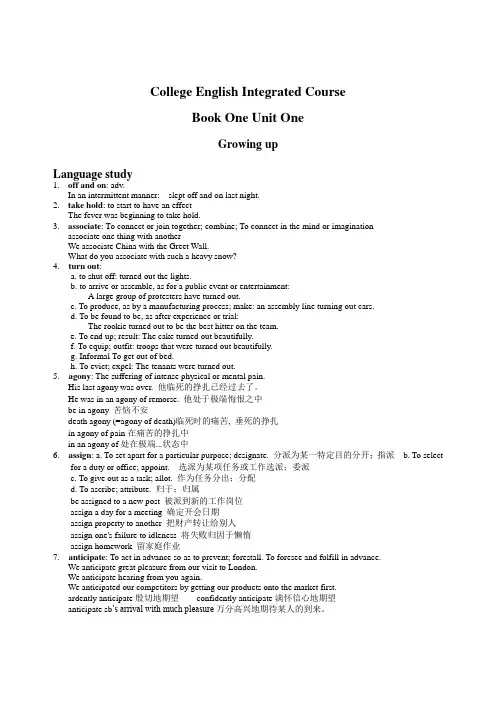
College English Integrated CourseBook One Unit OneGrowing upLanguage study1.off and on: adv.In an intermittent manner: slept off and on last night.2.take hold: to start to have an effectThe fever was beginning to take hold.3.associate: To connect or join together; combine; To connect in the mind or imaginationassociate one thing with anotherWe associate China with the Greet Wall.What do you associate with such a heavy snow?4. turn out:a. to shut off: turned out the lights.b. to arrive or assemble, as for a public event or entertainment:A large group of protesters have turned out.c. To produce, as by a manufacturing process; make: an assembly line turning out cars.d. To be found to be, as after experience or trial:The rookie turned out to be the best hitter on the team.e. To end up; result: The cake turned out beautifully.f. To equip; outfit: troops that were turned out beautifully.g. Informal To get out of bed.h. To evict; expel: The tenants were turned out.5. agony: The suffering of intense physical or mental pain.His last agony was over. 他临死的挣扎已经过去了。
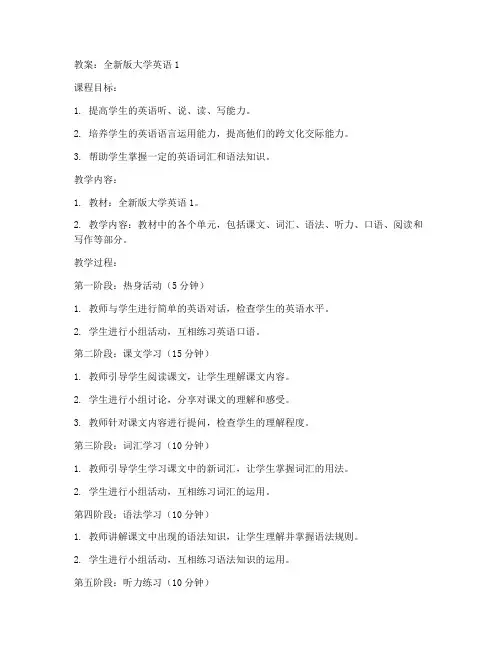
教案:全新版大学英语1课程目标:1. 提高学生的英语听、说、读、写能力。
2. 培养学生的英语语言运用能力,提高他们的跨文化交际能力。
3. 帮助学生掌握一定的英语词汇和语法知识。
教学内容:1. 教材:全新版大学英语1。
2. 教学内容:教材中的各个单元,包括课文、词汇、语法、听力、口语、阅读和写作等部分。
教学过程:第一阶段:热身活动(5分钟)1. 教师与学生进行简单的英语对话,检查学生的英语水平。
2. 学生进行小组活动,互相练习英语口语。
第二阶段:课文学习(15分钟)1. 教师引导学生阅读课文,让学生理解课文内容。
2. 学生进行小组讨论,分享对课文的理解和感受。
3. 教师针对课文内容进行提问,检查学生的理解程度。
第三阶段:词汇学习(10分钟)1. 教师引导学生学习课文中的新词汇,让学生掌握词汇的用法。
2. 学生进行小组活动,互相练习词汇的运用。
第四阶段:语法学习(10分钟)1. 教师讲解课文中出现的语法知识,让学生理解并掌握语法规则。
2. 学生进行小组活动,互相练习语法知识的运用。
第五阶段:听力练习(10分钟)1. 教师播放课文中的听力材料,让学生听懂并理解听力内容。
2. 学生进行小组活动,互相练习听力技巧。
第六阶段:口语练习(10分钟)1. 教师引导学生进行口语练习,让学生能够流利地表达自己的观点。
2. 学生进行小组活动,互相练习口语表达。
第七阶段:阅读练习(10分钟)1. 教师引导学生进行阅读练习,让学生能够快速阅读并理解文章内容。
2. 学生进行小组活动,互相分享阅读心得。
第八阶段:写作练习(10分钟)1. 教师引导学生进行写作练习,让学生能够准确地表达自己的观点。
2. 学生进行小组活动,互相评改写作作品。
第九阶段:总结与反馈(5分钟)1. 教师对本次课程进行总结,强调重点知识点。
2. 学生进行自我评价,反馈学习效果。
教学评价:1. 课堂参与度:学生参与课堂活动的积极程度。
2. 口语表达:学生口语表达的流利程度和准确性。
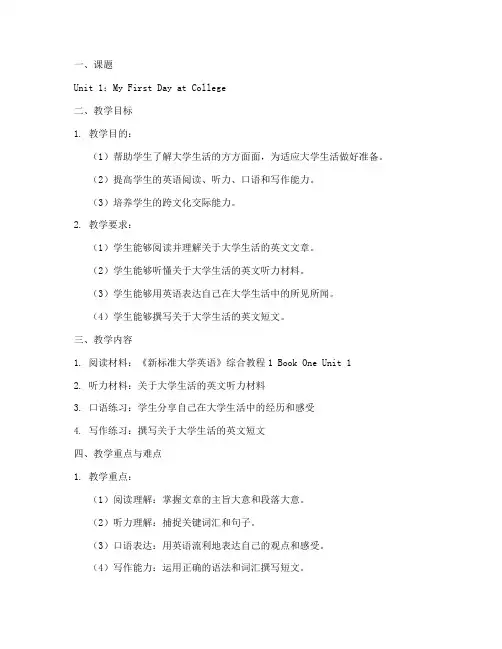
一、课题Unit 1:My First Day at College二、教学目标1. 教学目的:(1)帮助学生了解大学生活的方方面面,为适应大学生活做好准备。
(2)提高学生的英语阅读、听力、口语和写作能力。
(3)培养学生的跨文化交际能力。
2. 教学要求:(1)学生能够阅读并理解关于大学生活的英文文章。
(2)学生能够听懂关于大学生活的英文听力材料。
(3)学生能够用英语表达自己在大学生活中的所见所闻。
(4)学生能够撰写关于大学生活的英文短文。
三、教学内容1. 阅读材料:《新标准大学英语》综合教程1 Book One Unit 12. 听力材料:关于大学生活的英文听力材料3. 口语练习:学生分享自己在大学生活中的经历和感受4. 写作练习:撰写关于大学生活的英文短文四、教学重点与难点1. 教学重点:(1)阅读理解:掌握文章的主旨大意和段落大意。
(2)听力理解:捕捉关键词汇和句子。
(3)口语表达:用英语流利地表达自己的观点和感受。
(4)写作能力:运用正确的语法和词汇撰写短文。
2. 教学难点:(1)词汇理解:掌握与大学生活相关的词汇。
(2)语法运用:正确运用英语语法知识。
(3)跨文化交际:了解西方文化背景,提高跨文化交际能力。
五、教学过程1. 导入新课(1)教师简要介绍大学生活的相关背景,激发学生的学习兴趣。
(2)提问:学生对自己大学生活有什么期待?2. 阅读教学(1)学生阅读课文,了解文章主旨大意。
(2)教师讲解文章中的生词、短语和语法结构。
(3)学生分组讨论,分享阅读心得。
3. 听力教学(1)学生听关于大学生活的英文听力材料,捕捉关键词汇和句子。
(2)教师总结听力材料中的主要内容,并引导学生进行复述。
4. 口语练习(1)学生分组讨论,分享自己在大学生活中的经历和感受。
(2)教师鼓励学生用英语表达自己的观点,并给予适当的评价和指导。
5. 写作教学(1)学生根据课文内容,撰写关于大学生活的英文短文。
(2)教师批改作文,指出学生的优点和不足,并进行针对性指导。
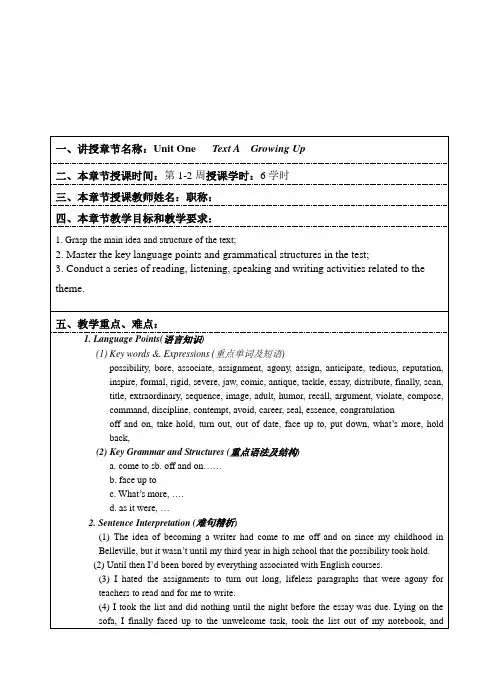
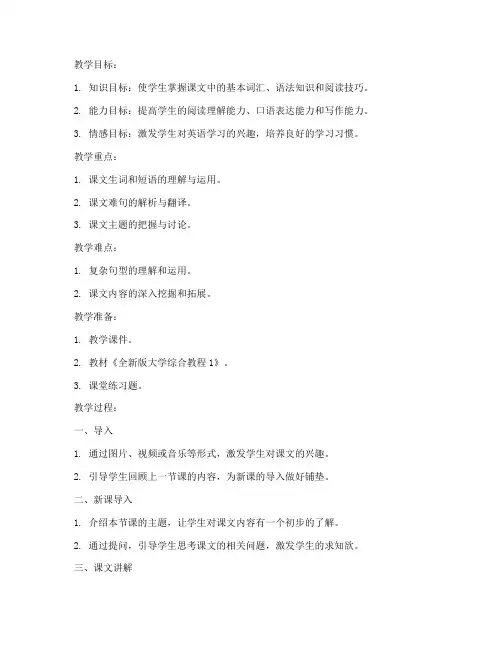
教学目标:1. 知识目标:使学生掌握课文中的基本词汇、语法知识和阅读技巧。
2. 能力目标:提高学生的阅读理解能力、口语表达能力和写作能力。
3. 情感目标:激发学生对英语学习的兴趣,培养良好的学习习惯。
教学重点:1. 课文生词和短语的理解与运用。
2. 课文难句的解析与翻译。
3. 课文主题的把握与讨论。
教学难点:1. 复杂句型的理解和运用。
2. 课文内容的深入挖掘和拓展。
教学准备:1. 教学课件。
2. 教材《全新版大学综合教程1》。
3. 课堂练习题。
教学过程:一、导入1. 通过图片、视频或音乐等形式,激发学生对课文的兴趣。
2. 引导学生回顾上一节课的内容,为新课的导入做好铺垫。
二、新课导入1. 介绍本节课的主题,让学生对课文内容有一个初步的了解。
2. 通过提问,引导学生思考课文的相关问题,激发学生的求知欲。
三、课文讲解1. 生词讲解:针对课文中的生词,进行详细讲解,包括词性、词义、用法等。
2. 难句解析:针对课文中的难句,进行逐句解析,帮助学生理解句子结构。
3. 课文主题讨论:引导学生围绕课文主题进行讨论,培养学生的口语表达能力。
四、课堂练习1. 阅读理解练习:通过阅读理解题,检验学生对课文内容的理解程度。
2. 写作练习:让学生根据课文内容,进行写作练习,提高学生的写作能力。
五、课堂小结1. 总结本节课的重点内容,帮助学生巩固所学知识。
2. 鼓励学生在课后进行自主学习和复习。
六、布置作业1. 阅读课文,完成课后练习题。
2. 收集与课文相关的词汇和短语,进行积累。
教学反思:本节课通过导入、新课讲解、课堂练习和课堂小结等环节,使学生对全新版大学综合教程1的课文内容有了深入的了解。
在教学过程中,注重培养学生的阅读理解能力、口语表达能力和写作能力,同时关注学生的情感需求,激发学生对英语学习的兴趣。
在今后的教学中,将继续优化教学方法和手段,提高教学效果。
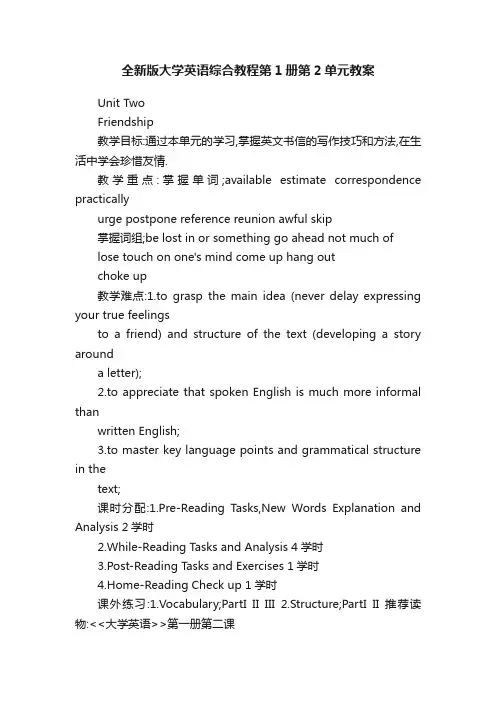
全新版大学英语综合教程第1册第2单元教案Unit TwoFriendship教学目标:通过本单元的学习,掌握英文书信的写作技巧和方法,在生活中学会珍惜友情.教学重点:掌握单词;available estimate correspondence practicallyurge postpone reference reunion awful skip掌握词组;be lost in or something go ahead not much oflose touch on one's mind come up hang outchoke up教学难点:1.to grasp the main idea (never delay expressing your true feelingsto a friend) and structure of the text (developing a story arounda letter);2.to appreciate that spoken English is much more informal thanwritten English;3.to master key language points and grammatical structure in thetext;课时分配:1.Pre-Reading Tasks,New Words Explanation and Analysis 2学时2.While-Reading T asks and Analysis 4学时3.Post-Reading Tasks and Exercises 1学时4.Home-Reading Check up 1学时课外练习:1.Vocabulary;PartI II III 2.Structure;PartI II 推荐读物:<<大学英语>>第一册第二课教学过程:Study of the TextCulture NotesHalloween is celebrated annually. It is on the night of 31 October, when people once believed that ghosts could be seen. Now, in Britain and America, it is a time when children have parties, dress up as witches, make lanterns out of pumpkins from which the inside has been removed, and play "trick or treat'.Trick or treat is a traditional activity at Halloween. Children dress in costumes and visit houses. At each house they say "Trick or treat'. This means that they will play a "trick', or joke, on the people in the house unless they are given a "treat', e.g. sweets or money. Most people prefer to give treats rather than having tricks playedon them.Pre-reading tasks1.T asks Ss the following questions on the song That's What Friends are For;---What is a fair weather friend?(one who is happy to stay with you when things are going well but leaves as soon as trouble arrives)---According to the song, what are friends for?(for both good times and bad times) 2.Warm-up QuestionsDo you often write letters to friends?1)T writes down the following words on the blackboard: frequently, sometimes rarely, never.2)T invites several Ss to give reasons for writing or not writing letters.3)T sums up by saying: letters are the best in expressing our innermost feelings.3.Topic-related Prediction1)Before you read the story, think about the answers to the following questions.What does a cabbie do?What is a letter used for?Who wrote the letter to the cabbie?Why was all the cabbie had only a letter?2)Read the last sentence of Text A and try to guess what the story is about. While-reading tasks1.Read Text A as quickly as possible, and find out if you are right. Can you summarize the story with three sentences?key words: lost in thought, read a letter, an old friend, lifelong friendship, regret, author decided2.Scan the text and find out how many questions the narrator asked the cabbie and what were the latter's responses.----At first, did you mistake Ed for the writer of this letter?----Which round of question-and-answer leads to the mistake?(the second round)3.Ss do Text Organization exercise on page 40./doc/1714972056.html,nguage study and text analysis1)be lost in/lose oneself in:be absorbed in, be fully occupied withe .g: He was lost in playing computer games so he was unaware of my entering the room.I had lost myself in thought.2)available: able to be used, had, or reachede.g. Since 1990, the mount of money available to buy books has fallen by 17%.We have already used up all the available space.3)He sounded as if he had a cold or something: This sentence implies the sad state mind the taxi driver was in.or something: used when you are not very sure about what you have just saide.g. The air fare was a hundred and ninety-nine pounds or something.Here's some money. Get yourself a sandwich or something.4)go ahead: continue, begin(sometimes followed by with + n)e.g. The board of directors will vote today on whether to go ahead with theplan.Henry will be late but we will go ahead with the meeting anyway.5)know/learn by heart: memorize, remember exactlye.g. You have to know all the music by heart if you want to be a concertpianist.The pupils are required to learn a classic poem by heart every day.6)At least they do with me because I'm on the road so much: At least lettersfrom home mean a lot to me because I travel a lot in a car for long distances.7)estimate: form a judgement about (a quantity or value)e.g. I estimate that the total cost for the treatment of the disease will gofrom$5,000 to $8,000.Bill's personal riches were estimated at $368 million.8)This isn't family.: This isn't a letter from my family.9)might/may(just) as well: not have a strong desire to do and may even slightlyreluctant about somethinge.g. Anyway, you're here; you might as well stay.The post office is really busy --we'll have to queue for ages to getserved. We might as well go home.10)I'm not much of a hand at writing.: I am not good at writing.not much of a: not a goode.g. Some people may think that doing housework for others is not much of acareer.He is not much of a father, but he is an outstanding professor.11)keep up: continue without stoppinge.g.: They risk losing their homes because they can no longer keep up therepayments.I was so hungry all the time that I could not keep the diet up for longerthan a month.12)correspondence: a)the act of writing, receiving or sending letters(不可加s, often followed by with + n)e.g. His interest in writing came from a long correspondence with a close friend.b)the letters that sb. receives or sendse.g. Mary really never mentions her step-mother in her correspondence.13)But I take it he's someone...:But I expect that he issomeone...e.g.: I take it(that) you've heard that all the students in my class have done a very good job in CET Band 4.14)practically: almost, but not completely or exactlye.g.: He'd known the old man for practically ten years.I know people who find it practically impossible to give up smoking.15)Went to school together? The complete sentence is like this: You went to schooltogether?(In colloquial English a declarative sentence with a rising tone may serve as a question.)16)neighborhood: one of the parts of a town where people livee.g.: It seemed like an ideal neighborhood to raise my children in.Houses in a good neighborhood are likely to be sold at a high price.17)kind of/sort of:("kind of”is esp.AmE, "sort of' esp.BrE) a little bit, in some way or degree(used before v. or after a link verb)e.g.: She wasn't beautiful. But she was kind of cute.The boy's description kind of gives us an idea of what's happening.18)lose touch(with sb.):meet or contact sb. less and less often, gradually stop writing,telephoning, or visiting theme.g.: I lost touch with my former classmates after graduation.In my job one tends to lose touch with friends19)a couple of:(infml)a few, more than one but not manye.g. Do you have a moment? There are a couple of things I'd like to talk to youabout.They promised the students that they would find a substitute teacher in acouple of days.20)But I realized that Old Ed was still on his mind when he spoke again, almost moreto himself than to me.: But I realized that the taxi driver was still thinking ofOld Ed when he spoke again. It seemed that he spoke more to himself than to me.on one's mind: in one's thoughts; of concern to one(If something is on your mind,you are worried or concerned about it and think about it a lot.)e.g.: Dealings on the stock market have been on his mind all the time.This travel plan has been on my mind all week.21)keep in touch(with sb): write, phone, or visit each other regularlye.g. The old man kept in touch with his children while living in a nursing house.While doing the research work in the antarctic, the professor kept in touch with his students via email.22)come up: a)happen, occur, esp. unexpectedlye.g.: "Sorry, I am late----something came up at home.'b)be mentioned or discussede.g.: The term "Project Hope' has come up a lot recently in the newspapers.23)urge: try very hard to persuade(often used in the pattern urge sb. to do sth.or followed by a that-clause. In the that-clause, "should' or the base form ofa verb is used.)e.g.: They urged the local government to approve plans for their reformprogramme.Sir Fred urged that Britain(should) join the European Monetary System.24)postpone: delay(usu. followed by n./gerund)e.g.: The couple had postponed having children to establish their careers.The Russian experts postponed dumping Mir(和平号Russia's space station)in the Pacific Ocean until March 23,2001.25)It had references to things that...:The letter made mention of things that...reference: a)the act of talking about sb./sth.,or mentioning them(usu. followedby to)e.g.: It was strange that he made no reference to any work experience in hisresume.b)the act of looking at sth. for informatione.g.: Keep their price list for further reference.26)"Like it says there,”..."About all we had to spend in those days was time.”: "Asthe letter says there,”..."though we didn't have much money we had a lot of free time.”27)absolutely: totally and completelye.g. Funding is absolutely necessary if research is to continue.There is absolutely no difference between the two oil-paintings.28)reunion: a party attended by members of the same family, school,or othergroup who have not seen each other for a long timee.g.: The soccer club holds an annual/yearly reunion.Before she went abroad for further study, the whole family had a big family reunion.29)...there are fewer and fewer still around.:...fewer and fewer of us are left alive.30)hang out: a)(infml: used mainly in AmE) stay in or near a place, for no particularreason, not doing very muche.g.: I often hung out in coffee bars while I was unemployed.b)hang clothes on a piece of string outside in order to dry theme.g.: What a pain!--It's raining and I've just hung the washing out.31)every now and then: sometimes, at timese.g.: Every now and then I have a desire to quit my tedious job.I still see Jane for lunch every now and then, but not as often as I used to.32)But for the last 20 or 30 years it's been mostly just Christmas cards.:But generally speaking we have sent only Chrismas cards to keep in touch with each other for the last 20 or 30 years.mostly: almost all; generallye.g.: They have invested their money mostly in expensive realestate.The guests at the wedding party are mostly friends of the bride.33)Your friendship over the years has meant an awful lot to me, more than I can say because I'm not good at saying things like that.: Your friendship over the years has been very important to me, more important than I can say because I'm not good at expressing my feelings.awful:(infml; used to add force) very great; very bad or unpleasante.g.: I have got an awful lot of work to do.I can't bear the awful smell of cigarette smoke.34)choke up: become too upset to speake.g.: When he learned the news of his friend's sudden death, he was so choked uphe couldn't say a thing.Losing my job left me completely choked up; I was so upset that I didn't know what to do.35)destination: the place to which sb. is going or being sente.g. Singapore is still our most popular holiday destination.Only half of the emergency supplies have reached their destination because of the bad weather.36)skip: pass from(one point, etc.) to another, disregarding or failing to act on whatcomes betweene.g.: The teacher skipped chapter five and said it wouldn't be on the test."As time is limited, we will have to skip some of the exercises in Unit 10,' said the teacher.37)right away: (infml)at oncee.g.: Tom has got a high fever; he should go and see a doctor right away.I wrote him a letter and posted it right away.5.What was the lesson the storyteller learned from the cabbie?(Never delayexpressing one's true feelings to one's friend.)6.T reads out the following sentences and Ss try to find out sentences ofsilmilar meaning in the text:---Go on reading your letter.(Go ahead and finish your letter.) ---I'm not used to writing letters.(I'm not much of a hand at writing.)---We were friends since our childhood. So our friendship has a long history.(We were kids together, so we go way back.)---For one reason or another you lose touch even though you never forget.(Youkind of lose touch even though you never forget.)---It is painful to lose any friend.(It's no fun to lose any friend.) T explains that since this story is developed mainly through the conversation between the cabbie and his passenger, it's language tends to be simpler and more colloquial, sentences tend to be shorter or even incomplete.Post-reading tasks1.T guides Ss through some after-text exercises.2.T checks on Ss' home reading(Text B).3.Ss do Part IV: Theme-related Language Learning Tasks.。
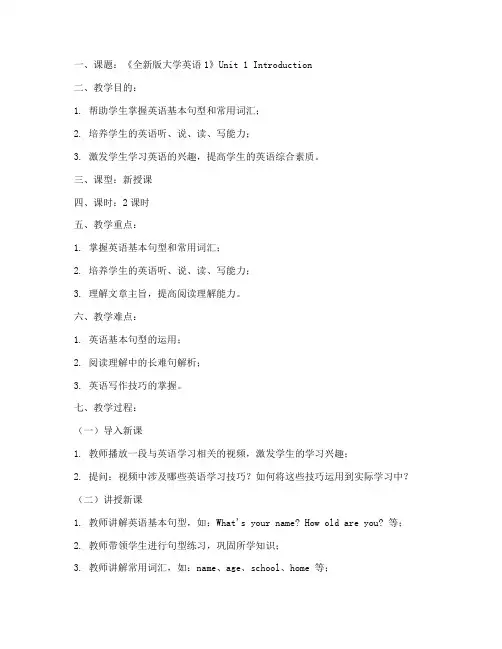
一、课题:《全新版大学英语1》Unit 1 Introduction二、教学目的:1. 帮助学生掌握英语基本句型和常用词汇;2. 培养学生的英语听、说、读、写能力;3. 激发学生学习英语的兴趣,提高学生的英语综合素质。
三、课型:新授课四、课时:2课时五、教学重点:1. 掌握英语基本句型和常用词汇;2. 培养学生的英语听、说、读、写能力;3. 理解文章主旨,提高阅读理解能力。
六、教学难点:1. 英语基本句型的运用;2. 阅读理解中的长难句解析;3. 英语写作技巧的掌握。
七、教学过程:(一)导入新课1. 教师播放一段与英语学习相关的视频,激发学生的学习兴趣;2. 提问:视频中涉及哪些英语学习技巧?如何将这些技巧运用到实际学习中?(二)讲授新课1. 教师讲解英语基本句型,如:What's your name? How old are you? 等;2. 教师带领学生进行句型练习,巩固所学知识;3. 教师讲解常用词汇,如:name、age、school、home 等;4. 教师引导学生进行词汇练习,提高词汇运用能力;5. 教师带领学生阅读课文,讲解文章主旨和段落大意;6. 教师解析阅读理解中的长难句,帮助学生提高阅读理解能力;7. 教师讲解英语写作技巧,如:如何组织文章结构、如何运用过渡词等。
(三)巩固练习1. 教师组织学生进行句型练习,巩固所学知识;2. 教师组织学生进行词汇练习,提高词汇运用能力;3. 教师组织学生进行阅读理解练习,提高阅读理解能力;4. 教师组织学生进行英语写作练习,提高写作技巧。
(四)归纳小结1. 教师总结本节课所学内容,强调重点和难点;2. 教师提醒学生在课后进行复习,巩固所学知识。
(五)作业安排1. 复习本节课所学英语基本句型和常用词汇;2. 阅读课文,完成课后练习;3. 按照所学写作技巧,写一篇英语短文。
八、板书设计:全新版大学英语1 Unit 1 Introduction一、英语基本句型:1. What's your name?2. How old are you?3. Where do you come from?4. What do you do?二、常用词汇:1. name2. age3. school4. home三、阅读理解:1. 理解文章主旨;2. 解析长难句;3. 提高阅读理解能力。
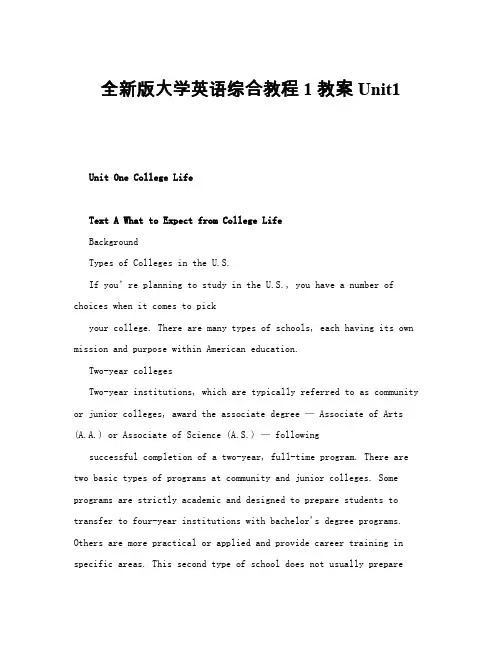
全新版大学英语综合教程1 教案Unit1Unit One College LifeText A What to Expect from College LifeBackgroundTypes of Colleges in the U.S.If you’re planning to study in the U.S., you have a number of choices when it comes to pickyour college. There are many types of schools, each having its own mission and purpose within American education.Two-year collegesTwo-year institutions, which are typically referred to as community or junior colleges, award the associate degree — Associate of Arts (A.A.) or Associate of Science (A.S.) — followingsuccessful completion of a two-year, full-time program. There are two basic types of programs at community and junior colleges. Some programs are strictly academic and designed to prepare students to transfer to four-year institutions with bachelor's degree programs. Others are more practical or applied and provide career training in specific areas. This second type of school does not usually preparestudents for transfer to a four-year institution, though some of the credits earned may still be accepted by a four-year institution.A small number of two-year colleges offer the final two years of the undergraduate program only, awarding the bachelor‘s degree rather than the associate degree. Most community and juniorcolleges are publicly supported by the state and local communities, although some are private. Some private two-year colleges areproprietary or run for a profit.Four-year colleges and universitiesThe college or university (sometimes called an institute when it emphasizes engineering or other technical courses) awards the bachelor's degree. The Bachelor of Arts (B.A.) or Bachelor of Science (B.S.) degrees are the most common, but a variety of bachelor's degrees by other names are also granted. Bachelor's degrees are typically awarded following successful completion of a four-year, full-time program. Programs in some fields of study or at some institutions can be longer than four years. There are both public and private colleges and universities in the United States, and some have an affiliation with a religious denomination.Public versus privatePublicly supported schools are generally state colleges or universities or two-year community colleges. These institutions receive most of their funding from the states in which they are located. Private schools generally have higher costs because they do not receive the sameprimary funding from the state and federal government. Colleges and universities with religious affiliations are private. Most of them are Christian (Roman Catholic and Protestant), although there are a small number of Jewish and Islamic institutions. In most cases, you do not need to be a member of a particular church or religious group to attend a religiously affiliated college and enrollment in these institutions will not usually interfere with your own religious views. Privately owned colleges Proprietary institutions are different from other types of schools in that they are privately owned and run for a profit. They are "educational businesses" that offer services and courses similar to those at other institutions, but you need to be very careful and research their accreditation status. Their programs tend to be technical and pre-professional courses of study.Almost all the colleges in the United States are now coeducational, which means that both men and women attend. There are also a small number of single-sex schools, some for men and some for women. Faculty, administration, and staff members will likely be of both sexes at any college.Words and Expressions1.a little bit有点He was a little bit under the weather. , 他生病了。
一、课题《全新版大学英语综合教程1》Unit 4:Great Expectations二、教学目的1. 知识与技能:(1)掌握本单元的生词和短语;(2)了解小说《大卫·科波菲尔》的背景和主题;(3)提高阅读理解能力,学会分析人物性格和情节发展。
2. 过程与方法:(1)通过小组讨论,提高学生的合作意识和沟通能力;(2)通过角色扮演,提高学生的口语表达能力;(3)通过写作练习,提高学生的写作能力。
3. 情感态度与价值观:(1)引导学生关注人物命运,培养同情心;(2)激发学生对文学作品的兴趣,提高审美情趣。
三、课型新授课四、课时2课时五、教学重点1. 生词和短语的理解与运用;2. 人物性格分析和情节发展。
六、教学难点1. 理解小说的主题和深层含义;2. 提高学生的阅读理解能力。
七、教学过程第一课时1. 导入新课(1)教师简要介绍小说《大卫·科波菲尔》的作者、背景和主题;(2)提问:同学们对这部小说有什么了解?2. 阅读课文(1)学生自读课文,完成课后练习;(2)教师检查学生的阅读情况,解答学生的疑问。
3. 小组讨论(1)将学生分成小组,讨论以下问题:①大卫·科波菲尔的人物性格有哪些特点?②小说中的情节发展有何特点?(2)各小组汇报讨论成果,教师点评。
4. 角色扮演(1)教师挑选学生扮演课文中的角色,进行角色扮演;(2)其他学生观看并评价。
5. 总结与作业(1)教师总结本节课的学习内容;(2)布置课后作业:写一篇关于《大卫·科波菲尔》的读书笔记。
第二课时1. 复习与巩固(1)检查学生的课后作业;(2)提问:同学们对《大卫·科波菲尔》有什么新的认识?2. 阅读拓展(1)教师引导学生阅读相关资料,了解小说的背景和主题;(2)学生分享阅读心得。
3. 写作练习(1)教师讲解写作技巧,布置写作任务;(2)学生完成写作任务。
4. 课堂小结(1)教师总结本节课的学习内容;(2)布置课后作业。
新通用大学英语综合教程第1册教学设计一、教学目标本教学设计旨在帮助学生掌握以下技能:1.掌握基本的英语词汇和语法结构;2.培养听、说、读、写的基本能力;3.积累学术英语词汇和表达;4.培养跨文化交流能力;5.提高自主学习和探究的能力。
二、教学内容1. Unit 1: Greetings and Introductions教学内容包括以下几个方面:1.在第一节课中,介绍英语的基本发音和书写规则;2.在第二节课中,学习常用的问候语和自我介绍语言;3.在第三节课中,练习日常对话中的基本交际技能;4.在第四节课中,通过听力和阅读材料,学习表述国籍、职业、兴趣爱好等个人信息;5.在第五节课中,综合运用已学知识,进行交流和互动。
2. Unit 2: Education and Learning教学内容包括以下几个方面:1.在第六节课中,通过听力和阅读材料,学习关于学校、课程、老师等教育的词汇和表达;2.在第七节课中,练习围绕教育话题进行交流;3.在第八节课中,通过听力和阅读材料,学习描述学习和学术的词汇和表达;4.在第九节课中,练习如何写好一篇英文作文,包括提纲、立意和语言表达;5.在第十节课中,通过阅读名人传记,了解优秀人物励志故事,培养学生的人文素养和文化兴趣。
三、教学方法为了达到预期的教学目标,本课程将采用多种教学方法与形式,包括:1.听说读写训练:鼓励学生多听多说,多读多写,提高英语综合应用能力;2.小组讨论:利用小组互动的方式,深入交流和思考话题;3.视听材料学习:通过看电影、听音乐等形式,扩大学生的语言视野和文化知识;4.分组演讲:培养学生口头表达能力和团队合作精神;5.阅读作业:通过阅读名人传记等材料,提升学生的阅读理解和文化素养。
四、教学评价为了实现教学质量的有效评估,本课程采取以下评价方式:1.出席率:考勤管理,要求学生至少出席80%的课程;2.作业完成率:平时布置有关听力、阅读、口头表达和写作的作业,要求学生完成并及时提交;3.组内评价和反馈:要求学生在小组内相互评价和反馈,提高学生对自己和互动团队的认识和实际表现;4.总评成绩:期末考试将占总成绩60%的比重,平时成绩占40%的比重,最终分数按照等级制公布。
一、课题全新版大学英语综合教程1 Unit 4二、教学目的1. 帮助学生掌握本单元的词汇和语法知识;2. 培养学生的阅读理解能力,提高学生的阅读速度;3. 培养学生的写作能力,提高学生的英语表达能力;4. 增强学生的跨文化交际意识,提高学生的英语应用能力。
三、课型新授课四、课时2课时五、教学重点1. 词汇:掌握本单元的核心词汇,如:potential, beneficial, diversity, culture, etc.;2. 语法:学习现在分词和过去分词的用法,以及它们的转换;3. 阅读理解:提高学生的阅读速度和理解能力;4. 写作:学会撰写一篇关于文化交流的短文。
六、教学难点1. 词汇:理解并掌握本单元的核心词汇;2. 语法:现在分词和过去分词的用法及转换;3. 写作:撰写一篇关于文化交流的短文。
七、教学过程(一)导入新课1. 通过图片、视频等形式,展示不同国家的文化差异,激发学生的学习兴趣;2. 提问:你了解哪些国家的文化?它们有什么特点?(二)讲授新课1. 词汇教学:通过例句、图片等形式,讲解本单元的核心词汇;2. 语法教学:讲解现在分词和过去分词的用法,以及它们的转换;3. 阅读理解教学:让学生阅读课文,分析文章结构,理解文章主旨;4. 写作教学:指导学生如何撰写一篇关于文化交流的短文。
(三)巩固练习1. 词汇练习:让学生通过填空、翻译等形式,巩固本单元的词汇;2. 语法练习:让学生进行语法填空、改错等练习,提高语法运用能力;3. 阅读理解练习:让学生阅读相关文章,回答问题,提高阅读理解能力;4. 写作练习:让学生根据所学内容,撰写一篇关于文化交流的短文。
(四)归纳小结1. 回顾本节课所学内容,总结本单元的词汇、语法、阅读和写作要点;2. 强调文化交流的重要性,提高学生的跨文化交际意识。
(五)作业布置1. 复习本单元的词汇和语法知识;2. 阅读相关文章,了解不同国家的文化特点;3. 撰写一篇关于文化交流的短文,字数不少于300字。
课程名称:大学英语综合教程1授课时间:第1课时教学目标:1. 让学生掌握本课的基本词汇和语法知识。
2. 培养学生的阅读理解能力、听说能力和写作能力。
3. 培养学生的跨文化交际意识。
教学内容:1. 词汇:掌握本课出现的生词和短语。
2. 语法:复习和巩固一般现在时、一般过去时、一般将来时等时态。
3. 阅读理解:通过阅读短文,提高学生的阅读速度和理解能力。
4. 听力理解:通过听力练习,提高学生的听力水平。
5. 口语表达:通过课堂讨论和角色扮演,提高学生的口语表达能力。
6. 写作:完成一篇与课文主题相关的短文。
教学过程:一、导入新课1. 通过提问学生关于英语学习的看法,激发学生的学习兴趣。
2. 引导学生回顾上一节课所学内容,为新课做好铺垫。
二、词汇教学1. 展示本课生词和短语,让学生自主朗读并解释其意思。
2. 通过例句和游戏,让学生熟练运用本课词汇。
三、语法教学1. 复习和巩固一般现在时、一般过去时、一般将来时等时态。
2. 通过例句和练习,让学生掌握时态的正确运用。
四、阅读理解1. 让学生阅读短文,并回答问题,检验学生的阅读理解能力。
2. 引导学生分析短文的结构和写作手法。
五、听力理解1. 播放听力材料,让学生听并回答问题。
2. 分析听力材料,提高学生的听力水平。
六、口语表达1. 通过课堂讨论,让学生发表自己的观点。
2. 通过角色扮演,提高学生的口语表达能力。
七、写作1. 分析写作要求,让学生明确写作方向。
2. 通过小组讨论,让学生互相交流写作思路。
3. 指导学生完成短文写作。
八、归纳小结1. 总结本课所学内容,帮助学生巩固知识。
2. 引导学生思考如何将所学知识应用到实际生活中。
九、作业布置1. 完成本课的课后练习。
2. 预习下一节课的内容。
教学评价:1. 通过课堂提问、练习和作业,评价学生的学习效果。
2. 关注学生的口语表达和写作能力,给予及时指导和反馈。
教学反思:1. 根据学生的学习情况,调整教学策略,提高教学效果。
New College English (Second Edition) Integrated Course 1 全新版大学英语(第二版)综合教程第1册Unit 1 Growing UpText A Writing for MyselfI。
Teaching ObjectivesStudents will be able to:1。
grasp the main idea (the essence of writing is to write what one enjoys writing)and structure of Text A (narration in chronological sequence);2. appreciate the narrative skills demonstrated in Text A (selection of details,repetition, coherence);3。
master the key language points and learn how to use them in context;4。
understand the cultural background related to the content;5. express themselves more freely on the theme of Growing Up after doing a series of theme—related reading,listening, speaking and writing activities;6. write a letter of congratulations in an appropriate way.II。
Teaching Focus1。
Talk with the students about the different ways of learning English in the middle school and college;2。
Unit 1 Growing upText A Writing for MyselfI. Teaching Plan1.Objectives1)Grasp the main idea (the essence of writing is to write what one enjoys writing.) And structure of the text (narration in chronological sequence);2)Appreciate the narrative skills demonstrated in the text (selection of details, repetition, coherence.);3)Master the key language points and grammatical structures in the text;4)Conduct a series of reading, listening, speaking and writing activities related to the theme of the unit. 2. Time allotment3. Pre-reading tasks1)Have you listened to John Lennon's Beautiful Boy? (2 minutes)The teacher (T) may ask several students (Ss) this question:__What does Lennon think of growing up?(Possible answers: Life better as one grows up; it takes time to grow up; life is not always what one has planned, but is full of surprises; life is adventurous.)2)The art of eating spaghetti (15 minutes)a)Before class, T cuts a sheet of paper into many long, thin strips, which he/she brings to class together with fork (Or: if possible, T brings a platter of boiled noodles to class together with a fork).b)T explains that spaghetti is Italian-style noodles, and that unlike some Chinese noodles. It will never taste pulpy and is usually served with sauce, not in soup. Several Ss are invited to come up with “proper ways of eating spaghetti” and demonstrate to the class, using the fork.c)T dictates the following passage to Ss (pre-teach some words like “poke”, “scoop”, “prong”, “twirl” if necessary):i.Hold the fork in your hand as if to poke the spaghetti.ii.Scoop up a small amount of spaghetti on your fork and raise it about 30 cm above your plate.iii.Make sure the spaghetti on your fork is completely disconnected from the remainder on your plate.iv.Put the prongs of the fork at an edge of the plate that is free of food.v.Quickly point the prongs of the fork straight down toward the plate and place the points on the plate.vi.Twirl the fork to gather the spaghetti around the prongs.vii.With a quick scooping movement, gather up the roll around the prongs and place it in your mouth.viii.Gently gather up any stray spaghetti ends that don't make it all the way into your mouth.d)T asks one S to come up and demonstrate the right way of eating spaghetti.3)T asks Ss the following questions:(8 minutes)__Would you enjoy writing “The Art of Eating Spaghetti”? Why or why not?__Why did Russell Baker enjoy writing “The Art of Eating Spaghetti”? (Hint: Para.4)__Look at the title of Text A, then find out in which paragraph a similar phrase appears. Read that paragraph carefully and explain in your own words what the author means by saying “write for myself”. (Hint: Para.5) 4. While –reading tasks1.Grasping the structure of the text: (15 minutes)1)Ss circle all the time words, phrases in Text A (They include: since my childhood in Belleville, until my third year in high school, until then, when our class was assigned to Mr. Fleagle for third-year English, late in the year, until the night before the essay was due, when I finished, next morning, two days passed, when I saw him lift my paper his desk… when Mr. Fleagle finished). When they finish, T asks several Ss to read aloud what they have circled.2)T draws Ss'attention to Organization Exercise 2 , reads its instructions, and asks them these two questions:__Refer to the time words/phrases/clauses you have just circled and tell from which point on Baker starts talking about his new experience. (Hint: the paragraph containing “later in the year”)__Starting from which paragraph does Baker stop writing about his new experience? (hint: the paragraph containing “when I finished” and “next morning”3)In this way Ss will be able to divide the text into 3 parts and sum up the main ideas.4)Several Ss report the main ideas they have summed up to the class.2.Cultural background---T explains the U.S. grade school system and how school teachers are dressed. (seeCultural Notes) (3 minutes)3.T explains language points and gives Ss practice. (see Language Study) (60 minutes)4.Grammatical structures. (25 minutes)1)T asks Ss to form pairs and ask each other questions based on Para. 2 using the structure “sb./ sth. is said/believed/reported to do/be”. T may offer the following model:__What kind of person is Mr. Fleagle?__He was said/reported/believed to be very formal, rigid and hopelessly out-of-date.Afterwards, a pair or two may repeat their questions and answers to the class.2)Ss do Structure Exercise 2 in the textbook.5.T draws Ss' attention to Writing strategy in Theme-related Language Learning Tasks, especially the part about details. (also see Text Analysis) T then asks the following questions:__In Part 1, what details are selected to show “I' d been bored with everything associated with English courses”?__In Part 1, what details are given to show that Mr. Fleagle was dull and rigid?__In Part 2, which sentences show that at first Baker was unwilling to write the essay?__In Part 3, the author didn't tell us directly that his essay was very good. By which sentences did he manage to give us the impression that his essay was very good? (12 minutes)6.Synonymous words or phrases in this text (see Text Analysis):1)T chooses one words from each group of synonyms listed in Text Analysis, and asks Ss to scan for respective synonyms. If Ss' findings are inconclusive, T may reveal those they have neglected.2)T may further provoke Ss' thinking by this question: Why does Russell Baker employ all these synonymous words and phrases? (15 minutes)7.When T and Ss come to the sentence “In the eleventh grade, at the eleventh hour as it were, I had discovered a calling.” In Para. 9, T may ask Ss to recall a similar sentence they have read. (Para.1, “The idea of becoming a writer had come to me off and on since my childhood in Belleville, but it wasn't until my third year in high school that the possibility took hold.”) By this T will show Ss the importance of coherence in writing. (5 minutes)5. Exercises1.Think alone: According to Mr. Fleagle, what is the very essence of the essay? (5 minutes)Then T invites several Ss to give their opinions. T may sum up by this sentence---The essence of good essay is to write what one enjoys writing about.2.T checks if Ss have done the rest of the after-text exercises in their spare time, and discusses somecommon errors that crop up. (10 minutes)3.T checks on Ss' home reading (Text B). (3 minutes)4.Ss do Part Iv: Theme-related Language Learning Tasks in class. (1 period)5.T asks Ss to prepare the next unit:1)Do the pre-reading task;2)Preview Text A. (2 minutes)6.Confusable phrases.Severe, stern & strictSevere: 作“严厉”解时,可以来形容人(severe father),人的面貌(severe look 严厉的神色),人的态度(the teacher is severe with his students.教师对学生很严厉。